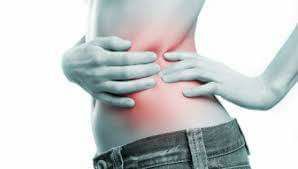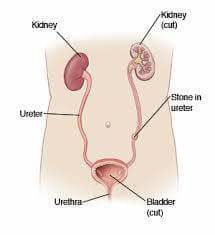Kidney Stones
What are kidney stones?
What causes kidney stones?
Kidney stones usually comprised of a compound called calcium oxalate, are the result of an accumulation of dissolved minerals on the inner lining of the kidneys. These deposits can grow to the size of a golf ball while maintaining a sharp, crystalline structure.
The kidney stones may be small and pass unnoticed out of the urinary tract, but they may also cause extreme pain upon exiting.
Kidney stones that remain inside the body can lead to many conditions, including severe pain and ureter (the tube connecting the kidney and bladder) blockage that obstructs the path urine uses to leave the body.
People with kidney stones are at a significantly higher risk of developing chronic kidney disease. What causes kidney stones? the leading cause of kidney stones is a lack of water. Stones commonly have been found in those that drink less than the recommended eight to ten glasses of water a day. When there is not enough water to dilute the uric acid (component of urine), the ph level within the kidneys drops and becomes more acidic. An excessively acidic environment in the kidneys is conducive to the formation of kidney stones.
Medical conditions such as crohn's disease, urinary tract infections, renal tubular acidosis, hyperparathyroidism, medullary sponge kidney, and dent's disease have been known to lead to kidney stones. It also has been suggested that water fluoridation - the addition of fluoride to drinking water - is responsible for some cases of kidney stones. Vitamin d and calcium supplements linked to kidney stone risk scientists at creighton university medical center, omaha, ne, usa, found that calcium and vitamin d supplements could increase the risk of developing kidney stones because they raise levels of calcium in the blood and urine.
Perhaps using vitamin d and calcium supplements is not as benign as people had thought. He advised people not to exceed the guidelines for these supplements of 800 international units of vitamin d, and 800-1, 200 milligrams of calcium per day (according to the institute of medicine).
'It is not clear whether it is the extra calcium, the vitamin d or both together that cause these problems.
However, it is possible that long-term use of supplements causes hypercalciuria and hypercalcemia, and this can contribute to kidney stones. For these reasons, it is important to monitor blood and urine calcium levels in people who take these supplements on a long-term basis. This is rarely done in clinical practice'
Who gets kidney stones?
Kidney stones are twice as common among males as females. Most people who experience kidney stones do so between the ages of 30 and 50. A family history of kidney stones also increases one's chances of developing them at some point in life. Similarly, a previous kidney stone occurrence increases the risk that a person will develop subsequent stones in the future if preventative action is not taken.
Certain medications can increase the risks of developing kidney stones. Scientists found that opiramate (topamax), a drug commonly prescribed to treat seizures and migraine headaches, can increase the propensity of calcium phosphate kidney stone.
The more overweight a person is the more at risk he or she is for forming uric acid kidney stones, a study found.
Additional risk factors for kidney stones include diets that are high in protein and sodium but low in calcium, a sedentary lifestyle, obesity, high blood pressure, and conditions that affect how calcium is absorbed in the body such as gastric bypass surgery, inflammatory bowel disease, and chronic diarrhea.
A study indicated that kidney stones among children are on the rise.
What are the symptoms of kidney stones?
A kidney stone usually remains symptomless until it moves into the ureter. When symptoms become apparent, they include:
Severe pain in the groin and/or side
Blood in urine
Vomiting and nausea
White blood cells or pus in the urine
Reduced amount of excreted urine excreted
Burning sensation during urination
Persistent urge to urinate
Fever and chills if there is an infection
How are kidney stones diagnosed?
Several different tests can verify the existence of a kidney stone. A physical examination may reveal colicky pain (in the groin) and pain in the lower back by the kidneys - often warning signs of the condition. An analysis of the urine will indicate whether or not there is blood in the urine and if there is a subsequent infection. Blood tests can be done to identify complications that may accompany a kidney stone and check the validity of the diagnosis.
A ct scan of the abdomen is the most thorough way to test for kidney stones. A ct scan will ascertain the state of the ureter, bladder, and kidneys, whether or not a stone exists, the kidney stone's exact size and location, whether or not a blockage exists, and the state of the other adjacent organs such as the appendix, aorta, and pancreas. Pregnant women may receive an ultrasound rather than a ct scan in order to avoid unnecessary radiation.
Once a patient is diagnosed with a kidney stone, simple x-rays will be used to track the stone's progress through the excretory system.
Top 8 natural remedies for kidney stones that really work
Affecting around 10% of the population of the world and most common in men between the ages of 30 and 40, kidney stones are a painful and often recurring issue that can last for weeks at a time. Stones are formed when high levels of calcium, sodium, uric acid (the same stuff that causes gout flare-ups), or other crystal-forming substances build up in the urine to levels which the body cannot properly eliminate. These substances gather and chemically bond to each other forming a stone inside the organ. Some kidney stones are very small and may be passed out in the urine with minimal or no symptoms. Others may grow quite large and eventually become lodged in the opening of the urethra - the tube that allows urine to pass from each kidney to the bladder. At this point the stones cause pain, frequent urge to urinate, nausea, vomiting, and excessive sweating among other things.
If you're one of the unlucky 10% who has experienced kidney stones, or if someone in your family has gotten them in the past (kidney stones are hereditary), you probably want to read on to discover the top eight natural remedies for kidney stones that will help to prevent, alleviate the discomfort of, and break apart those nasty little rocks before they become a big problem.
1. Hydration, hydration, hydration
It's always a good idea to drink lots of water (use this calculator to find your daily requirement.) however, when you have kidney stones or if you think that you might be susceptible to them, it's absolutely critical to keep adequate fluids running through your system in order to flush out the minerals and other substances that cause stones to form. If you don't have the time (or patience) to measure and track your daily water intake, simply remember this general rule: the darker your urine is, the more water you need. When your urine comes out clear or close to it, you know you're drinking enough.
2. Apple cider vinegar
Apple cider vinegarit's on the 'top 10 natural ingredients' list for a good reason. Apple cider vinegar is an effective remedy for a long list of ailments, including kidney stones. Not only will acv help to break apart and flush out stones, regular consumption of around 2 tablespoons per day can help to prevent future occurrences. Try an apple cider vinegar tonic first thing in the morning, again around midday, and a third time in the evening to reap the health benefits of this incredible natural remedy and get rid of your kidney stones at the same time. Simply mix 2 tablespoons of raw organic unfiltered acv (my favorite by far is this one by bragg) with an all natural sweetener such as honey or stevia powder and about 4 ounces of water.
3. Lemon juice + olive oil
While this method may not be suitable for people with larger stones, those with smaller kidney stones can try a concoction of lemon juice and olive oil to help break them apart and flush them out. Mix quarter cup each of lemon juice and olive oil, drink, and follow up with at least 8 ounces of water. Just make sure you're using only high-quality ingredients so you don't accidentally introduce something into your body (like sucrose or h. F. C. S.) that will worsen the condition.
For a delicious, organic lemon juice with zero added sweeteners, pesticides, or other contaminants, I recommend Santa Cruz pure organic unsweetened lemon juice. Also, if you haven't experienced the line of Bragg organic products yet (or even if you have and you love them as much as I do) try out their 100% pure organic extra virgin olive oil to experience the best olive oil flavor and maximum all-natural health potential from a name you can trust!
4. Pomegranate juice
A 2008 study concluded that pomegranate juice prevents the formation of certain types of kidney stones. If you think you're at risk for kidney stones, enjoy a serving or two of pomegranate juice every day. Not only will your kidneys thank you, pomegranates are also full of antioxidants that protect the body from damaging free radicals. What's not to love?
Try it out for yourself. I recommend Lakewood organic pomegranate juice for flavor and purity. You can order it by the case (about a 2-week supply) from this page on amazon.
5. Nettle leaf tea
Stinging nettle tea while stinging nettle is most commonly used for joint support and to relieve seasonal allergy symptoms, it is also a powerful diuretic with anti-bacterial properties. Drinking two to three cups of nettle leaf tea per day will work wonders to flush minerals and toxins out of the kidneys, halt the growth of existing stones, and discourage the formation of new ones, all the while helping to prevent urinary tract infections - another known cause of kidney stones.
6. Vegetable proteins
It's a well-known fact that over-consumption of certain animal proteins can cause kidney stones. If you are prone to the condition, consider replacing some (not necessarily all) of the meats in your diet with vegetable protein sources. While a lot of people may groan at the idea of giving up their beef, pork, eggs, fish, etc - the excruciating pain of passing a kidney stone after kidney stone might be incentive enough. Some excellent veggie sources of protein include green peas, chia seeds, quinoa, spirulina, almonds, beans, hummus, and of course soy. Just remember, you need approximately 50 grams of protein per day. If you plan to switch from meat to vegetable sources, you may want to first familiarize yourself with the protein contents of these foods.
7. Get your fiber
Many vegetable protein sources also have the benefit of being great sources of insoluble fiber - another effective remedy for halting the growth of existing kidney stones and preventing the formation of new ones. Insoluble fiber helps to reduce calcium in the urinary tract by binding to it in the intestines. Calcium passed through the stool means less of the mineral is available to crystallize in the kidneys. Some great sources of soluble fiber include whole grains, legumes, fruits, and green vegetables.
While many fruits and vegetables are excellent sources of fiber, be aware that they may also contain high levels of oxalate which is one of the major causes of kidney stones. Read more about high-oxalate foods in this article by the university of Pittsburgh medical center.
8. Kidney beans
On a similar note (and somewhat ironically) kidney beans - so called for their resemblance in shape and color to the same-named organ - are also great for clearing up kidney stones. Kidney beans are not only very high in fiber, they're also a great source of non-animal protein, b vitamins, and minerals that improve urinary tracts and kidney health. To get the most out of your kidney beans, cook them in water (avoid meat broth, salt, etc) until they are tender enough to eat. Strain the liquid, let it cool, then strain it again. You can drink the resulting bean broth to help dissolve and flush out stones then eat the delicious beans themselves to boost your overall kidney health.




+1.svg)
